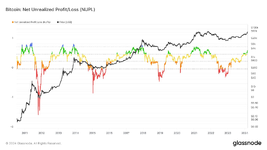@cosine - Everything you say is correct.
View attachment 5744
The market has been driven by the Bitcoin halving cycle, in which the BTC supply has halved in around April 2012, 2016, 2020 and soon 2024.
Each four year bull run cycle has followed the same pattern of:
1) a hard bounce off the price when RSI hits about 30 on a 1w view - (after a one year bear market) [* the March 2020 RSI at 30 was caused by an exchange failure]
2) first year of the bull market drifts up slowly
3) second year of the bull market sees a large movement up (Nov 2016, Sep 2020, Feb 2024)
4) third year of the bull market see big movements up, with multiple large corrections that don't last long, numerous parabolic movements
I watched the last two just expecting what happened in the previous ones, and that's what's happened. There needs to be an outside event to knock it off course, like a recession or government action.
There are a lot of people who have observed these patterns and are basing all their decisions on them, so it's now highly cemented. Of the people I am exposed to, no one is planning to hold any crypto in 2026. Everyone is expecting the trend to be the same as it has been in the last three cycles. A stock trading mentality will tell you not to do these things. Just as a crypto trading strategy for stocks is inoperable, since there are not such predictable patterns; particularly with the highly central bank driven market of 2009-. It's a gold rush, like tech stocks, gold in CA, early domain names. There is a trajectory and patterns. We are not at the point of diminishing returns or extreme strategies to try and beat the market. Probably at least two more cycles.
I think crypto will pan out a lot like you mention the dot com bubble onwards. The current tech is generally not fit to run what proponents are trying to run on it. I didn't hear anyone talking about the limitations of Ethereum in 2020. It was my main holding based on the premise that I saw lots of projects built on it, that required to use it to operate. Yet by early 2021, ETH had been exposed as something completely inadequate; only being able to handle 20 TPS. Likewise, go back a few years and there were a lot of economically illiterate people talking about BTC as money, which no one says now as it's too obvious it's not. But the crypto space is full of maxis, who just choose something to believe in, and have little to no understanding of economics that the space must eventually be tied to.
I don't see any of the projects around now necessarily being around in ten years, with the exception of Qubic and maybe BitTensor. If you look at all these 1,000s of projects that have been built - generally the premise is some kind of more open or decentralised version of things that already exist - banks (wallets), crypto-games, decentralised hosting, decentralised computing power, decentralised AI. And Qubic is the only solution that all of them could run on at web speed - Internet 2.0 - in which all these companies like Amazon, Amazon Web Services, Google, Facebook, Minecraft etc. could be replaced by ones that are more open or completely decentralised. But with everything else that has come, it's possible/likely limitations of Qubic would be exposed further down the line.
At current the decentralisation question hasn't been solved, since most crypto projects are still running on centralised Internet 1.0 infrastructure like AWS, ICANN domains etc. The blockchain trilema also hasn't necessarily been solved:
Bitcoin can't scale and Solana isn't that secure or centralised. Solana has had around 100 hours of down-time which is as unacceptable as a global internet blackout. This is the first cycle where we see L1s that may potentially solve it. That is POW chains with smart contracts and high TPS - Qubic, Alephium, SPACE.
Bitcoin has a 2D ledger to store transactions in, which is why it's so slow. DAG POW chains like Kaspa, Alephium and SPACE are 3D, which (I believe) allows them to be as secure as Bitcoin while offering 10K TPS. Qubic has a 4D ledger, which allows it to be secure while providing a tested 40m TPS with 0.2s finality. We will have to see how this progresses, but the data I've seen suggests L2s are unnecessary, because everything and more can be done on a better L1.
The way I see it panning out is that in 20 years or so, such projects will have or be taking huge chunks out of these large companies. Silicon Valley will become another Detroit and at best the companies will be General Motors tier. The decentralised nature will mean the current powers that be, who are looking to harness blockchain for efficiency and to make most/many people redundant, should be replaced. The coming years will see a race between decentralisation and those who wan't to harness new technology to control society. I see bad futures down both paths.
One issue is the value and need for tokens. You can say the same for stocks. The only value of stocks, really, is at IPO, where people fund the future economic activity of a company. After that they don't really offer anything to the economy. They distribute value from workers to speculators. The argument is that stocks are tied to economic activity. But you can't redeem the stock for the economic activity or anything the company owns. You can just sell to another speculator.
The system in crypto is various ways of projects selling tokens to early investors; and later selling more tokens into the market to raise funds. Since there is very little real economic activity in the space, it is difficult to argue that they are backed by anything. It's pretty much all speculation. A difference is these tokens are meant to be currencies for some sort of ecosystem or system. That is not the case with stocks that only have a buy and sell mechanism. Tokens are a way of actually transferring some kind of perceived value. But at the end of the day there isn't an actual need for these tokens. All projects could just accept an L1 cryptocurrency (and many do). Exactly how this will be resolved is unclear, as these tokens are the method of projects bootsrapping capital. Otherwise you're left with open source projects trying to make waves with only nerds and community funding.
If you are looking to escape the system, I don't see anything worth buying other than crypto. As outlined there are issues, but I think this is the space where money will predictably flow for the next decade. My plan is to move 10% into a real estate ballast in 2026, continue to play the game and use more to chip away at the gay empire we live in.

Apes do great in crypto if they get in and out at the same right time.


